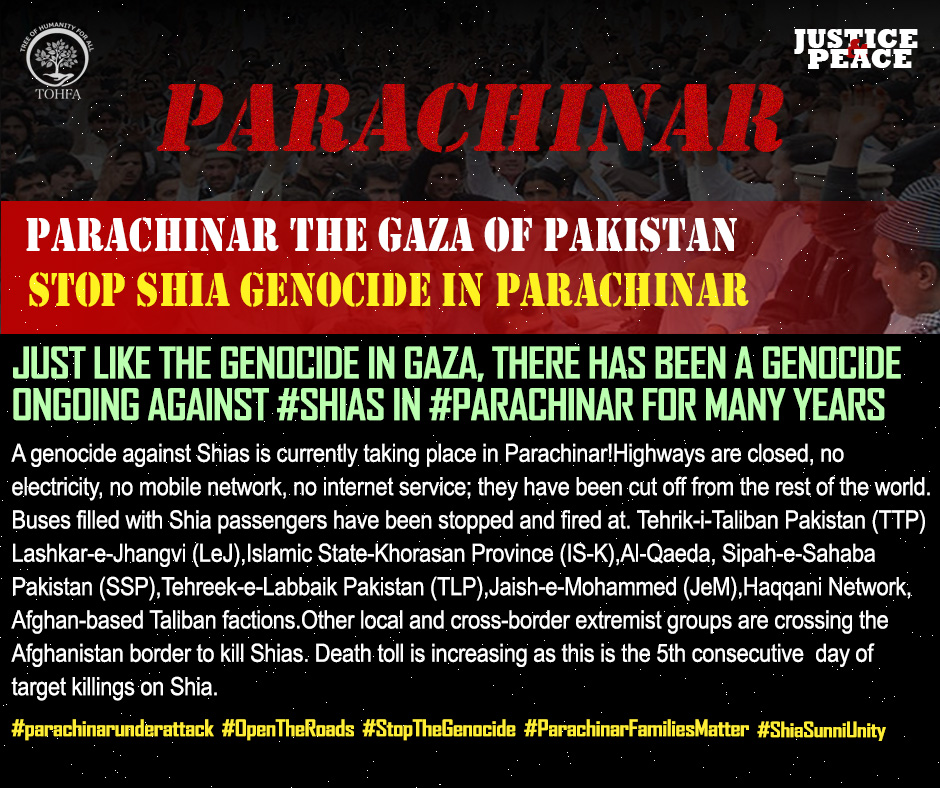TREE OF HUMANITY FOR ALL
Menu
Parachinar, the capital of Kurram District in Pakistan, is enduring an unprecedented humanitarian crisis, driven by systemic violence, targeted sectarian attacks, and gross governmental negligence. Over 850,000 residents have been trapped under a suffocating blockade for more than 90 days, deprived of essential supplies, including food, medicines, LPG, fuel, oxygen, and other critical resources. Hundreds of lives have already been lost, including at least 85 children and many adults who succumbed to injuries, starvation, or preventable illnesses. The region’s dwindling resources will only last another seven days, after which the death toll is expected to escalate exponentially unless immediate action is taken.
This suffering is exacerbated by extremist groups, including Tehrik-i-Taliban Pakistan (TTP), Lashkar-e-Jhangvi (LeJ), Islamic State-Khorasan Province (IS-K), Al-Qaeda, Sipah-e-Sahaba Pakistan (SSP), Tehreek-e-Labbaik Pakistan (TLP), and Jaish-e-Mohammed (JeM). These groups exploit unresolved land disputes to justify their relentless violence against Shia, Christian, Hindu, and Sikh populations.
This is nothing else but an unimaginable genocide targeting the Shia community. It is not new—Parachinar has a history of horrifying attacks so gruesome and relentless that they defy comprehension, leaving generations scarred and communities devastated

The Forgotten Genocide of Parachinar: 130 Years of Oppression and Resilience
Parachinar, the capital of Kurram District in Pakistan, is not just enduring a crisis—it is living through a harrowing chapter of a 130-year-long genocide. Its strategic location, bordering Afghanistan and situated on the historic Silk Road, has turned this land into a battleground for geopolitical interests and sectarian violence. Over generations, the resilient people of Parachinar—primarily the Shia community—have faced relentless violence, blockades, and neglect. What is happening now is not new; it is a continuation of over a century of systemic oppression and targeted extermination.
______________
130 Years of Suffering: A Historical Perspective
Since the late 19th century, Parachinar’s strategic location has made it a focal point of conflict. This region, rich in culture and diversity, has been repeatedly targeted due to:
• Geopolitical Interests: Its proximity to the Afghan border and central location in the region has made Parachinar a flashpoint for various powers.
• Sectarian Divide: Shia Muslims, who form the majority here, have been systematically persecuted by extremist groups and ignored by successive governments.
• Unresolved Land Disputes: Historical disputes over land ownership have been weaponized to fuel hatred and justify violence.
From the British colonial era to modern-day Pakistan, Parachinar’s residents have faced massacres, displacement, and blockades. The current blockade and violence are the latest chapter in this century-long tragedy.
______________
The Current Crisis: A Genocide Ignored
In the past 100+ days, over 850,000 residents have been suffocating under a blockade that deprives them of essential supplies. The humanitarian toll is staggering:
• Hundreds of Lives Lost: At least 128 children and 200+ adults have succumbed due to starvation, injuries, and preventable diseases because No Basic Human Needs and Help was available.
• Deaths and Injuries: In the past two years Altogether, approximately 630+ people have lost their lives, 1200+ Injured, including the deaths and injuries of the civilians due to the unavailability of Supplies, (Food, Fuel, Oxygen, Kids supplies and most importantly Medicines).
• Critical Shortages: Food, medicine, LPG, fuel, oxygen, and other essentials are running out. Experts estimate that resources will last just 10 more days before the death toll skyrockets.
• Extremist Violence: Groups such as Tehrik-i-Taliban Pakistan (TTP), Lashkar-e-Jhangvi (LeJ), Islamic State-Khorasan Province (IS-K), and others exploit the chaos to perpetuate terror and target minorities.
This is not just a crisis—it is a genocide. Parachinar’s people are being systematically eradicated while the world remains silent.
______________
The Role of Extremist Groups
For decades, extremist organizations have exploited Parachinar’s strategic location to further their agendas. Groups such as
• Tehrik-i-Taliban Pakistan (TTP): Operating from Afghanistan, the TTP targets Shia populations, with financial backing from Gulf donors.
• Lashkar-e-Jhangvi (LeJ): Funded by Saudi Wahhabi networks, this group has carried out some of the most brutal anti-Shia massacres.
• Islamic State-Khorasan Province (IS-K): Utilizes sanctuaries in Afghanistan to launch attacks on Pakistani Shia communities.
• Al-Qaeda: Historically linked with the TTP, spreading extremist ideologies and targeting minority groups.
• Sipah-e-Sahaba Pakistan (SSP): A Sunni extremist group responsible for inciting sectarian violence.
• Tehreek-e-Labbaik Pakistan (TLP): Politically aligned with anti-Shia rhetoric, exacerbating sectarian divides.
• Jaish-e-Mohammed (JeM): Known for targeting minorities and conducting cross-border operations.
______________
Why Parachinar Matters
Parachinar’s location is of immense strategic importance:
• It connects Pakistan with Afghanistan and Central Asia.
• It is a gateway for trade and cultural exchange.
• It has historically been a centre of resistance against imperial and extremist forces.
However, this importance has come at a devastating cost. Parachinar’s residents have paid the price for their homeland’s strategic value with their lives.
______________
The Time for Action Is Now
The world cannot afford to ignore this crisis any longer. The genocide in Parachinar is a stain on humanity’s conscience. We must act now to:
• Break the Blockade: Immediate humanitarian intervention is essential to provide food, medicine, and other critical supplies.
• Hold Extremists Accountable: International pressure must be applied to dismantle extremist networks operating in the region.
• Demand Government Accountability: The Pakistani government must take responsibility for protecting its citizens and addressing systemic neglect.
• Raise Global Awareness: Share this story far and wide. Let the world know that Parachinar’s suffering has gone on for over a century.
______________
What You Can Do
1. Spread Awareness: Use social media, local platforms, and global networks to amplify this message.
2. Contact Authorities: Pressure your local and international leaders to take action.
3. Support Relief Efforts: Donate to organizations working on the ground to support Parachinar’s residents.
4. Stand Against Injustice: Unite with others to demand justice for the oppressed.
.
